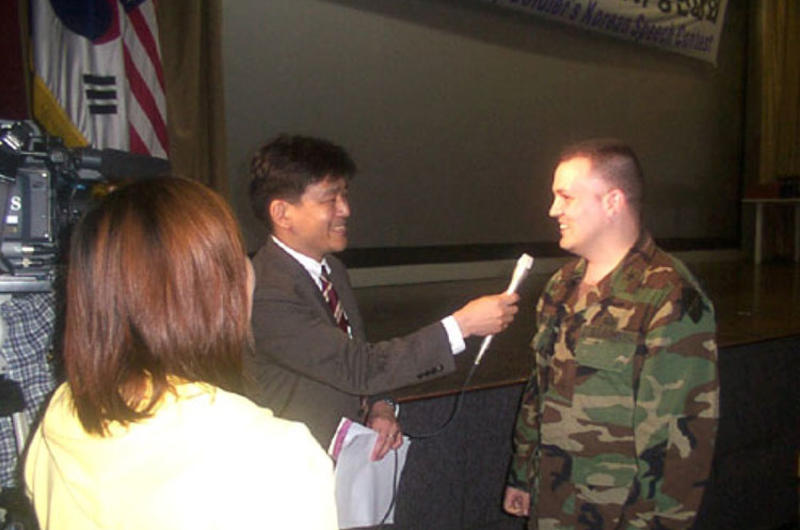Koreans know a few GIs who speak their language

Capt. Richardson Blair IV is interviewed by Japanese television after a rousing speech that garnered him first place in the 8th annual Korean language speech contest Wednesday at Balboni Theater.
By Jeremy Kirk | Stars and Stripes July 11, 2004
YONGSAN GARRISON, South Korea — Capt. Richardson Blair IV, dressed in U.S. Army camouflage, strutted around the Balboni Theater stage Wednesday, microphone in hand, smoothly crooning “The Southbound Train to Ho-nam,” a classic Korean folk song as hundreds cheered.
The tune, a popular drinking song with older Koreans in singing parlors, helped earn Blair first place in the 8th annual Korean Language Contest. He was among 14 U.S. soldiers showing off their linguistic chops at the event.
Proficiency ranged from novice to fluent, a fact that impressed hundreds of South Korean soldiers assigned to the U.S. Army units in attendance. Blair’s finish was almost a no-brainer considering his animated, lively presentation and nearly nine years of Korean language skills.
Blair thought he was supposed to give a speech appealing to senior South Korean officers. But at the last minute organizers told him contestants would be judged on humor and audience response.
He scratched his speech, grabbed the microphone and told two humorous stories of life in South Korea; a language mix-up with a taxi driver and a misinterpretation of a South Korean grandmother’s kindness.
“I just did it on the fly,” said the 31-year-old Blair, Suwon Air Base deputy installation commander. “I completely changed my speech and threw some karaoke in there.”
Last year Blair lost the contest to another soldier whose skills were just as good while twirling a baton, he said.
“This time I decided that the language part wasn’t as important as the entertainment part,” Blair said.
Korean isn’t easy to conquer. While fairly simple to read, grammar is brutal: verbs end sentences, and modifier and subject placement is quite different than in English. Good pronunciation requires practice, patience and a careful finesse — lest phrases become a garbled vocal soup.
Sgt. Sean O’Brien’s speech, “My Second Home,” revolved around the good experiences he’s had in South Korea. O’Brien, who placed in the middle group in the contest, is in his third South Korea tour since 1998.
His South Korean friends tweaked his speech after many corrections.
“I was essentially talking about how some soldiers come out on assignment, and they may talk negative about [South Korea],” O’Brien said. “I just pretty much explained it’s not that bad.”
The 30-year-old saxophonist with the 2nd Infantry Division band has had no formal Korean language classes and studies on his own. O’Brien said he can follow about 40 percent to 50 percent of casual Korean speech.
Koreans are flattered when foreigners use their language, O’Brien said.
“Learn some phrases and go out and speak it,” he said.



